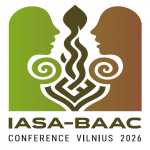2nd Global Audiovisual Archiving Conference: Exchange of Knowledge and Practices
2nd Global Audiovisual Archiving Conference: Exchange of Knowledge and Practices
Toronto, Canada
12th - 14th July 2024
Presented by Archive/Counter-Archive, Eye Filmmuseum and the Toronto International Film Festival® (TIFF)
2024 Conference Theme: Building Alliances
(A)rchival endeavors should not be about documenting the past, nor even about imagining the future…but about building a liberatory now.
-Michelle Caswell, Urgent Archives: Enacting Liberatory Memory Work (2021, 13)
(T)he archival impulse could be recast… as the possibility of creating alliances: between text and image, between major and minor institutions, between filmmakers, photographers, writers and computers, between online and offline practices, between the remnant and what lies in reserve, between time and the untimely. These are alliances against dissipation and loss, but also against the enclosure, privatization and thematisation of archives, which are issues of global, and immediate, concern.
- Pad.ma, “10 Theses on the Archive” (2010) https://pad.ma/documents/OH
The biennial Global Audiovisual Archiving Conference is an opportunity for scholars, archivists, artists, curators, filmmakers, students, and film enthusiasts from across the world to gather and explore contemporary professional, artistic, and socio-political issues affecting audiovisual heritage today. The aim of the conference is to broaden the knowledge and connections within the global archival community, leading to new insights into the material and cultural resonances of archival approaches to sound and moving image in different parts of the world.
Audiovisual archives are being redefined by the communities who care for and use them. In the 21st century, new names for archival collections and new approaches to archives are helping to shape collective histories, often informed by a plurality of regional, local, activist, and cultural communities rather than broadly based nationalist identities. These are fostering new understandings of what it means to “decolonize memory institutions” such as public archives, cultural memory centres, galleries, and museums (Thorkelson, 2019) as well as de facto repositories or accidental archives (Cheeka, 2023) such as media distribution centres, co-ops, academic institutions, and public libraries – not to mention all kinds of private and personal archives. The problems that smaller archives face include a lack of space for storage, funds to access digitization technologies (Declercq, 2020; Suárez, 2021), and the specialised labour, informed by archival training in best practices that are often required to safeguard material histories, especially those carried by analogue and born-digital media (Jaillant, 2022; Liebermann, 2021; Moravec, 2021). Often these “best practices” are drawn by richer institutions, without due consideration of or engagement with the contexts, resources, and politics of other regions. Equally important is the reuse and co-creation of media that activates archival materials in novel ways for contemporary audiences in a way that ensures their longevity. There is no doubt that the practices of “doing archives” are “on fire” around the world (Caswell, 2021; Chew et al., 2018; Paalman et al., 2021).
The 2nd Global Audiovisual Archiving Conference invites papers and presentations in a variety of formats that address the challenges and generative opportunities afforded by diverse media archives, from those that are publicly/privately funded to those surviving on very little support. We are especially interested in marginalised audiovisual archives, whether collections vulnerable to disappearance and inaccessibility or archives that are invisible and need to come into being. Central to our conference is the importance of identifying gaps in the field, building bridges, creating archival networks, fostering collaborations (Pretlove, 2021), and uncovering or deepening alliances (Heidiger et al., 2021). Such approaches may be tied to designing practices of care (Campanini, 2023) and pedagogical approaches for the next generation of archivists, artists, activists, humanists, and historians in ways that are inclusive, expansive, liberatory, and that might reinvent and redefine archival language and protocols. The conference also explores the emergence of theoretical questions, and novel ways of understanding history through notions of entanglement (Namhila and Hillebrecht, 2022) and redefinitions of allyship and stewardship that mark a critical paradigm shift in the field of archival studies.
Travel Grant Program
We have established a limited number of travel grants for speakers at the Global Audiovisual Archiving Conference. The grants, up to $500 each, can be used to partially offset registration and travel costs. To apply, please complete the final Travel Grant Application section of the proposal form, where you will be asked to submit a brief paragraph outlining your financial need and how attending the conference will contribute to your professional development. Please email any questions you might have about these travel grants to globalarchiving@gmail.com.
Registration
For this edition, we offer a hybrid conference format to accommodate everyone. Please note that all presenters must register for the conference and that we do not provide registration or financial compensation for speakers, with the exception of a limited number of travel grants.
Program Committee
- Keith Bennie (Toronto International Film Festival)
- May Chew (Concordia University)
- Almudena Escobar López (Toronto Metropolitan University)
- Giovanna Fossati (Eye Filmmuseum/University of Amsterdam)
- Susan Lord (Queen’s University)
- Janine Marchessault (York University)
- Natania Sherman (Toronto International Film Festival)
- Michael Zryd (York University)
Advisory Board
- Ines Aisengart Menezes (Witness)
- Carolina Cappa (Elias Querejeta Zine Eskola)
- Karen Chan (Asian Film Archive)
- Martino Cipriani (RMIT University Saigon/University of Amsterdam)
- Tamer El Said (Cimatheque - Alternative Film Centre)
- Anne Gant (Eye Filmmuseum)
- Maral Mohsenin (Geneva International Film Festival)
- Judith Opoku-Boateng (University of Ghana)
- Nour Ouayda (Filmmaker & Researcher)
- Asli Ozgen Havekotte (University of Amsterdam)
- Floris Paalman (University of Amsterdam)
- Lisabona Rahman (Freelance Moving Image Preservation and Presentation Consultant)
- Aboubakar Sanogo (Carleton University)
- Gerdien Smit (Eye Filmmuseum)
- Stefanie Schulte Strathaus (Arsenal - Institute for Film and Video Art)
- Juana Suárez (New York University/APEX)
- Eleni Tzialli (Eye Filmmuseum)
- Nadine Valcin (Sheridan College)
This event is organised by Archive/Counter-Archive in collaboration with Eye Filmmuseum and the Toronto International Film Festival.
For more information, please visit the following link: www.counterarchive.ca/gava-2024


